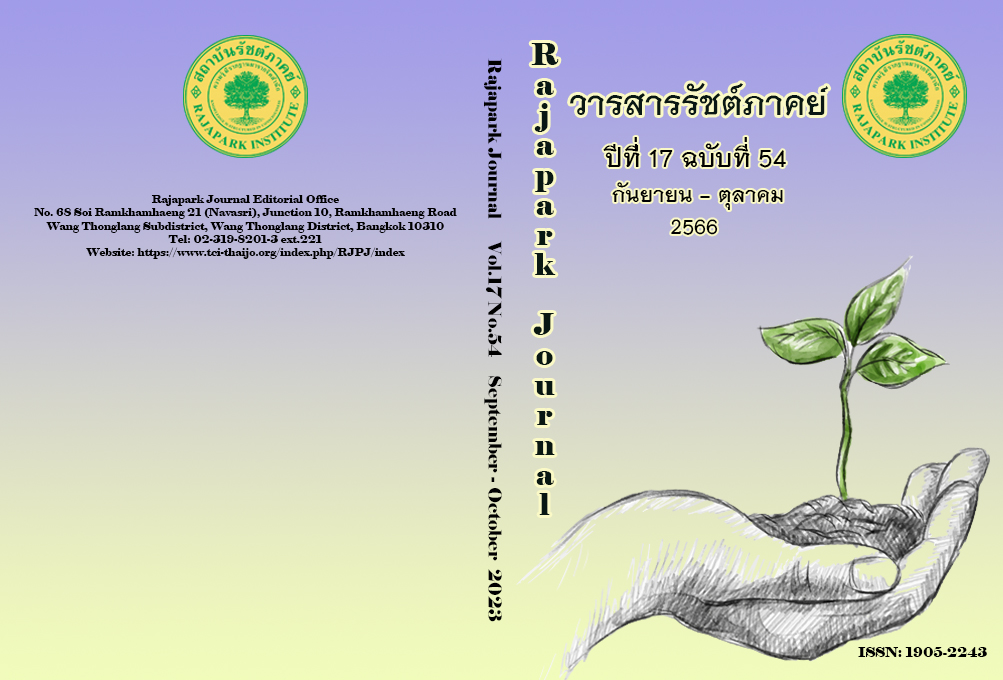Legal Measures to Protect the Rights of Witnesses in the Interrogation Stage: The Analysis of the Supreme Court Judgement No. 3214/2560
Main Article Content
Abstract
The objective of this study was to examine the legal measures to protect the rights of witnesses in the interrogation stage who later become the accused under the Emergency Decree on Public Administration in Emergency Situations, B.E. 2548 (2005). This was done by studying the analysis of Supreme Court Judgement No.3214/2560. Judgement here referred to the testimony in the investigation file as evidence in court without the case that the right to receive notification of rights of the arrested person has been performed under the Criminal Procedure Code, Section 84(2), because, according to the Emergency Decree on Public Administration in Emergency Situations, B.E. 2548 (2005), Section 11(1), (2), the interrogation method is used with a procedural subject or a suspect, which makes the person who is summoned to be a witness in the criminal case by means of interrogation as a subject or a suspect to the inquiry official as a witness, not an arrested person. This is not enforced under the Criminal Procedure Code, Section 84, Paragraph 4, which states that the accused or arrested person has the right to be informed of their rights. As a result, such a person is not protected in regard to their human rights in the criminal justice process. The Emergency Decree on Public Administration in Emergency Situations, B.E.2548 (2005) and the Criminal Procedure Code should be amended to protect the rights of witnesses in the interrogation stage who later become the accused.
Article Details

This work is licensed under a Creative Commons Attribution-NonCommercial-NoDerivatives 4.0 International License.
Views and opinions appearing in the Journal it is the responsibility of the author of the article, and does not constitute the view and responsibility of the editorial team.
References
Choosang, Y. (2016). Principles of Hearing of Evidence Occurred or Acquired Wrongfully: A Comparative Study of Evidence Acquired by Private Entities and That Acquired by Government Officials[Master’s thesis, Thammasat University].
Duplatre, L., & Lulitanon, W. (2018). The Law of Evidence and Psychology. Winyuchon.
Kramontrakul, K. (2008). Guidelines for Building Peace in Three Border Provinces from the Perspective of Those Affected by the Violence. Office of the National Human Rights Commission of Thailand.
Na Nakhon, K., et al. (2009). State powers to detain persons under special laws. Faculty of Law Thammasat University.
Phakdithanakul, J. (2022). The Law of Evidence (16th ed.). Institute of Legal Education Thai Bar Association.
Rattanakorn, S. (2022). An Explanation of the Law of Evidence (13th ed.). Winyuchon.
Sitthiphram, N. (2015). Law Enforcement and Human Rights Violations in Three Southern Border Provinces of Thailand[Master’s thesis, Assumption University].
Suppakarn, S. K. (2022). Principles and Judgements: The Law of Evidence in Civil/Criminal Cases (3rd ed.). Amarin.
Suriya, N. (2022). Declaration of Human Rights. In The Book of Remembrance of Assoc. Prof. Nophanidhi Suriya. (pp.134-148). Duantula.
The Constitution of the Kingdom of Thailand B.E. 2560 (2017). (2017, April 6). The Royal Thai Government Gazette. Book No.134. Part 40A. pp 12.
The Emergency Decree on Public Administration in Emergency Situations B.E. 2548 (2005). (2005, July 16). The Royal Thai Government Gazette. Book No.122. Part 58A. pp 1.
The Supreme Court Judgement No.3214/2560. (2022, December 10). https://deka.in.th/view-611815.html
The Justice Group. (2021). The Code of Criminal Procedure and the Constitution of the Court of Justice, the Latest Revision 2021. Pim Aksorn.
Tiamjan, B., & Witchatham, B. (2017). The Constitution of the Kingdom of Thailand, B.E. 2560 with Topics in All Sections, Complete edition. Inspal.
Vachanasvasti, K. (2004). Rights of the Accused not to Self-incriminate. Journal of Law, 34(2), 3-13.
Wannasang, P. (2022, December 10). Unit 12 Listening to Evidence in Criminal Cases. https://www.stou.ac.th/schoolsweb/law/UploadedFile/41717-12.pdf


